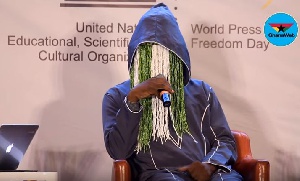The ace investigative journalist, Anas Aremeyaw Anas’s latest investigative work, which is dubbed, ‘Number 12’ and the ensuing scepticisms have invariably sparked public discussions.
The multitudes of admirers who are in support of Anas’s contrivance outweigh the paucity of sceptics who are disgusted about his modus operandi.
I have heard and read from both sides of the heated debate and would like to contribute to the ongoing public discourse.
And, for the purposes of this article, I will focus on the quintessential critic, the Honourable Kennedy Agyapong’s perspective on the ongoing discussions.
Believe it or not, it would only take a disputatious character to contend that Anas is not a super anti-corruption crusader who has immensely contributed and still contributing meaningfully to the almost insurmountable fight against the canker of corruption through his ingenuity.
Somehow, the Honourable Kennedy Agyapong is alleging that he has startling evidence to suggest that the respected investigative journalist Anas Aremeyaw Anas is not the perfect creature as he would like the whole world to believe.
As it was expected, there have been avalanche of criticisms and protestations against the Honourable Kennedy Agyapong for alleging that Anas has some “cobwebs in his cupboard”.
Well, in as much as the Anas’s fanatics may have valid reasons to defend him against any perceived unfair criticisms and attacks, we cannot and must not swiftly repel any allegations without proper investigations.
The all-important question however is: ‘who watches the watchman?’
The preceding question was first posed in Latin, but it is just as important today as it was 2,000 years ago.
Let us however be true to ourselves, any agencies or individuals that have the privilege to investigate or uncover misdeeds can also commit same flagitious deeds in the process. To err is human after all.
In that regard, isn’t it fair and convenient for anybody who has any concerns to call for a probe into the dealings of such persons?
Indeed, “he who comes with equity must come with clean hands.”
I must, however, confess that I do not have any problem with the Honourable Agyapong’s plangent calls to investigate Anas alleged misdeeds. However, I am not in acquiescence with his argument over Anas modus operandi.
In fact, the sceptics have every right to raise concerns over Anas’s modus operandi. Nevertheless, we can draw on a growing body of extant literature, experiential learning, theoretical and knowledge-based resources to buttress the point that the gentleman is adhering to the international best practice.
Apparently, investigative journalism is a form of journalism in which reporters deeply investigate a single topic of interest, such as serious crimes, political corruption, or corporate wrongdoing.
“An investigative journalist may spend months or years researching and preparing a report.”
Based on the preceding acceptation of investigative journalism, it would be somewhat specious for anybody to suggest that Anas is not a true investigative journalist. Indeed, patriotic journalists like Anas are zestfully acknowledging the role of citizens of Ghana as encapsulated in Article 41 (f) of the 1992 Constitution under the Directive Principles of State Policy.
It stresses: “it shall be the duty of every citizen to protect and preserve public property and expose and combat misuse and waste of public funds and property.”
Besides, any journalist who chooses to combat the corrosive effects of corruption is rather reaffirming the Constitution of the Ghana Journalists Association in which the association has pledged to: “strive for public accountability and serve as the watchdog of the people’s rights and liberties against all forms of infringements or abuse of rights.”
According to the UK Press Complaints Commission, “undercover journalism is an "honourable tradition" and subterfuge is "justifiable" in the pursuit of a story.”
"There is a legitimate place for the use of subterfuge when there are grounds in the public interest to use it and it is not possible to obtain information through other means."
“It would not be in the broader public interest for journalists to restrain themselves unnecessarily from using undercover means because of a false assumption that it is never acceptable."
"Undercover investigative work has an honourable tradition and plays a vital role in exposing wrongdoing. It is part of an open society. But it risks being devalued if its use cannot be justified in the public interest (PCC 2007).”
The investigative journalism is a profession that would most likely require a more discreet approach to collating information as the material would probably prove damaging to somebody – whether possibly relating to political corruption or even corporate wrong doing. However, there are restrictions on what is deemed acceptable in cases of public interest and what is considered a breach of the Editor’s Code of Practice (Source: PCC).
Let us, therefore, extol the ace investigative journalist, Anas Aremeyaw Anas for his great sense of patriotism, vigilantism and unparalleled courage.
We would, however, be extremely disappointed if the Honourable Kennedy Agyapong’s numerous allegations against the valiant Anas turn out to be truism.
K. Badu, UK.
k.badu2011@gmail.com
Opinions of Tuesday, 5 June 2018
Columnist: K. Badu














